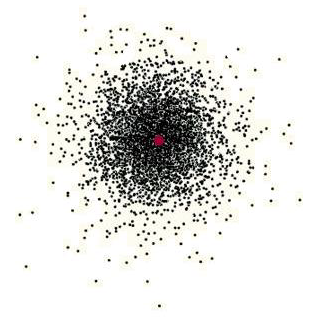A man named Dan called about the apartment for rent. I told him my wife would call him back. She then told me it had been rented. I wanted her to call Dan and tell him. Why couldn't I have called him myself?
I might have simply been worried about talking on the phone. More likely, I was consciously worried he might feel like he was dealing with confused, or untrustworthy people. Surely, people should be organized and know whether an apartment was still available. Did I not have a good communicating relationship with my wife? What did this say about me?
My wife thought I was being ridiculous. Why would Dan think any of this? And if he did, why would I care what he thought, a complete stranger? Most likely, he wouldn't think this at all. Who is so skeptical and judgmental, paranoid about of the motives of others?
I realized this is a pattern with me. Very often, I am overly concerned about what people might be thinking of me. I often shrink from conflict in order to avoid the possibility that they might think poorly of my character. I might be blind to some true failing in myself, one they of course can sniff out from the slightest trace of weakness. I find myself assuming a sort of game face, afraid of tipping my hand, tipping them off that I am indeed weak and vulnerable, morally conspicuous and lacking in integrity.
Yet all of this presumes that I might be interpreted this way. Likely, I am not. Why would I assume such motives in others? From where does this insecurity come? Is it a false concept of myself, that I fear is true and will be found out? Or is it a false conception of others, that they would be prone to harbor such sentiments?
I suppose both could be to some degree true. Yet both also influence each other: if I assume problems in myself, I'll likely assume others will see them. If I assume others will perceive flaws in me, I may see this as a pattern that implies some truth about myself.
I do often assume that others have found flaws in me and then spend lengthy amounts of time going over the situation in my head, wondering whether or not it is really true. Do I really do X? Am I really like Y? Introspection is important; we need to be aware of who we truly are and what we do. But one can also be overly introspective, looking for trouble where none exists.
At the macro level, we face many risks in our day to day life, yet would be crippled if we attended to them in improper proportion to their probability. Sure, driving a car is dangerous, but to worry that other cars might all suddenly slam in to us would prohibit driving. Likewise, we may come off as rude to someone, yet what is the probability? Must we analyze every word we speak in the context of a likelihood that we were indeed rude? Is there a pattern?
This is an issue of cognition. We all develop a framework of self with which we assume ourselves to be functioning in the world. When we drive, this framework entails our past experiences driving, and we project the likelihood that we and others will drive safely. In interpersonal relations, so too do we have a framework. It entails our past experiences interacting with others, and we project the likelihood of how we and others will behave, feel and respond a given way.
Of course, our experiences driving a car are much more limited, and our interactions concrete. Usually, our cognition is sound. However, one might imagine that after some traumatic incident, this cognition might become impaired, and faulty predictions might be made based on unconscious anxieties. Interpersonal relationships are infinitely more complex, and the cognitive framework is enormous, encompassing vast stretches of one's life, one's varied relationships with others, as well as one's understanding of one's self in multiple contexts.
The cognitive framework is partially biological, based in temperament and predisposition to a variety of conscious states, not the least of which being manifestations of mood. But it is also of course environmental, or learned. Cognitive patterns begin to be laid down from birth, as the ways in which we begin to interact with the world begin to build a framework of consciousness - ultimately what we perceive as the self and the other.
Sorting out what one's cognitive framework consists of, assuming much of it is unconscious - learned and temperamental, is a monumental task. Yet through this sort of meta-analysis, trying to find patterns in how we tend to perceive ourselves and others, can at least give us a way of framing our behavior. That is, we may never know
why we feel and respond the way we do, or what an other is thinking or feeling, but we can at least attempt to find an objective understanding of
what we think and fell, and what they say and do in response.
To someone such as myself, who tends to enjoy thinking and critically examining himself and the world around him, a dangerous trap can be found in introspection. The very bravado that comes from having sorted out many intellectual dilemmas, or at least the sense of accomplishment in sorting them out to a satisfactory degree
through pure intellect, can impart a seductive sense that all problems can be sorted out by analysis. Yet reason, especially when directed at the self (or at others via the self) cannot be decoupled from feeling. Thus, pure intellect is inevitably insufficient. And when faced with this challenge, the belief that what is always required is
more reason can result in unremittant perseveration.
So what the meta-cognitive model allows is a sort of escape valve: allow the intellect to continue, yet confine it to only limited examination of interactions between self and others, and task it instead with a more prominent engaging of one's cognitive framework as a whole, allowing it to create, in a sense, a framework for your cognitive framework. In my case, what might be more meaningful than dwelling on specific, situational interactions, is doing so in limited fashion, while at the same time keeping an eye out for larger patterns throughout my interactions and subsequent thought processes.
So, why was I worrying what Dan might have thought of me? This is the interesting question, not whether what I said or did was correct. It was after all, a brief and inconsequential interaction. Why do I have a pattern of assuming that others will spot weaknesses in me, think poorly of me? Have I learned to see this is in people's nature? Have I learned to see weakness in myself? What does this say about my father and mother, my family and friends? Surely at least some temperament as well as attitudinal relationship must exist. These are the important things to ponder, and likely what will ultimately help me understand my true self.









